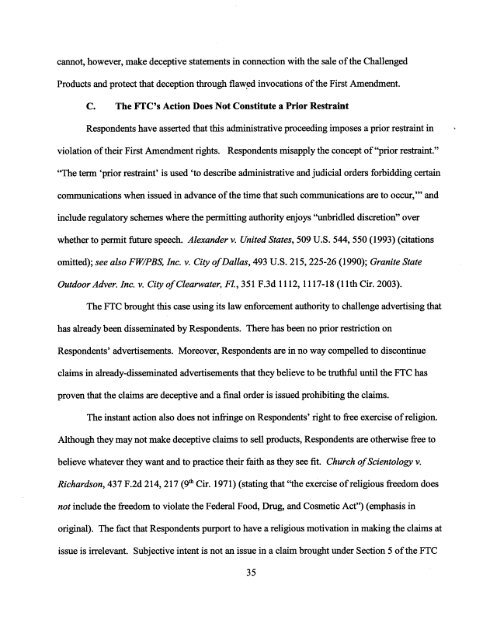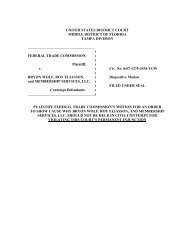Complaint Counsel's Post Trial Brief - Federal Trade Commission
Complaint Counsel's Post Trial Brief - Federal Trade Commission
Complaint Counsel's Post Trial Brief - Federal Trade Commission
Create successful ePaper yourself
Turn your PDF publications into a flip-book with our unique Google optimized e-Paper software.
canot, however, make deceptive statements in connection with the sale of the Challenged<br />
Products and protect that deception through flaw,ed invocations of<br />
C. The FTC's Action Does Not Constitute a Prior Restraint<br />
the First Amendment.<br />
Respondents have assered that this admistrative proceeding imposes a prior restraint in<br />
violation of their First Amendment rights. Respondents misapply the concept of<br />
"prior restraint."<br />
"The ter 'prior restraint' is used 'to describe adminstrative and judicial orders forbidding certain<br />
communcations when issued in advance of the time that such communcations are to occur,'" and<br />
include regulatory schemes where the pertting authority enjoys ''ubridled discretion" over<br />
whether to pert futue speech. Alexander v. United States, 509 U.S. 544, 550 (1993) (citations<br />
omitted); see also FW/PBS, Inc. v. City of Dallas, 493 U.S. 215, 225-26 (1990); Granite State<br />
Outdoor Adver. Inc. v. City of<br />
Clearwater, Fl., 351 F.3d 1112, 1117-18 (11th Cir. 2003).<br />
The FTC brought ths case using its law enforcement authority to challenge adverising that<br />
has already been dissemated by Respondents. There has been no prior restrction on<br />
Respondents' adverisements. Moreover, Respondents are in no way compelled to discontinue<br />
claims in aleady-disseminated adverisements that they believe to be trthful until the FTC has<br />
proven that the clais are deceptive and a final order is issued prohibiting the claims.<br />
The instant action also does not infrge on Respondents' right to free exercise of<br />
religion.<br />
Although they may not make deceptive clais to sell products, Respondents are otherise free to<br />
believe whatever they want and to practice their faith as they see fit. Church of Scientology v.<br />
Richardson, 437 F.2d 214,217 (9th Cir. 1971) (stating that ''the exercise of<br />
religious freedom does<br />
not include the freedom to violate the <strong>Federal</strong> Food, Drug, and Cosmetic Act") (emphasis in<br />
origial). The fact that Respondents purort to have a religious motivation in makng the claims at<br />
issue is irrelevant. Subjective intent is not an issue in a claim brought under Section 5 of the FTC<br />
35

















